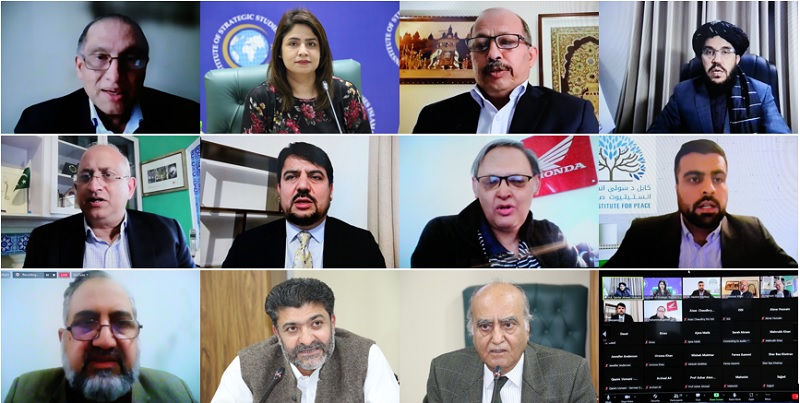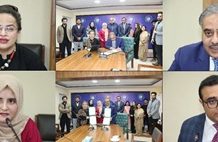Press Release
Webinar
Pak Afghan Economic Ties: Opening New Vistas
November 14, 2022

The Centre for Afghanistan, Middle East and Africa CAMEA at the Institute of Strategic Studies, Islamabad (ISSI) organized a webinar on Pak-Afghan Economic Ties: Opening New Vistas on November 14, 2022. The distinguished speakers included, Ambassador Mansoor Ahmed Khan, Pakistan’s Former Ambassador to Afghanistan, Sardar Ahmad Shakeeb, Charge d’ Affairs/Minister Counselor, Afghanistan Embassy, Islamabad, Mr. Haroon Sharif, Former Minister of State and Chairman Board of Investment, Shinwari, Former Deputy of the International Trade Department at the Ministry of Commerce and Industry, Afghanistan, Mr. Adnan Jalil, Peshawar Chamber of Commerce and Industry and Mr. Hashim Pashtun, Kabul Institute of Peace. The webinar was moderated by Ms. Amina Khan, Director of the Centre for Afghanistan, Middle East and Africa (CAMEA). Ambassador Aizaz Ahmad Chaudhry, Director General, ISSI and Ambassador Khalid Mahmood, Chairman Board of Governors also participated in the webinar.
While giving her introductory remarks, Ms. Amina Khan, stated that in a rapidly changing world, which is fast transitioning from geo-politics to geo-economics, regional economic integration and regional connectivity have gained utmost importance. She further explained that the relationship between Afghanistan and Pakistan is unique, as both countries complement each other in terms of trade and economic opportunities through bilateral and transit trade. Since August 2021, we have seen an increase in trade activity between the two, with Afghan exports to Pakistan, jumping from $550 million to $700 million; this can be attributed to bilateral cooperation and trade-related concessions by Pakistan, increased purchases of Afghan coal and the introduction of an operationalized Integrated Transit Trade Management System (ITTMS) Torkham. She further opined that while Pakistani exports may have declined to Afghanistan, its exports to Central Asian countries through Afghanistan rising by 70 % from $118 million to $202 million in the last 11 months. The decline in Pakistani exports can be attributed to ongoing US sanctions, the absence of banking channels and non-availability of dollars in Afghanistan, as well as a drop in demand for certain Pakistani goods. She concluded by saying that despite the current hurdles and imbalances in trade, a lot more can be done to further the true potential of trade between the two through bilateral and transit trade.
Ambassador Aizaz Ahmad Chaudhry, in his welcome remarks stated that Pakistan and Afghanistan have shared destinies and are now focusing on shared economic linkages. He stressed on the importance of strong economic ties between the two countries.
Ambassador Mansoor Ahmed Khan, while expressing his views stated that this is a very important topic for the entire region as the economic potential is immense, with common markets, common culture and other factors. These connectivity advantages that both Pakistan and Afghanistan sit on have not been made use of substantially. He further said that four decades of war have added to the impediments and it is unfortunate that the political approach has always taken precedence over economic approaches as political approaches have always been guiding the decision making process. Peace, stability and development could not be realized in the 1990s and after August 15, 2021, peace is there but regional tensions remain. The cross border connectivity is also an impediment. He further said that there is immense trade and transit potential but if how goods cross the border does not reflect this potential. He went on to say that the non recognition of the current regime in Afghanistan may be an impediment. The economic sanctions are hurting the people of Afghanistan and we need more coordinated approaches. Focusing on the way forward, he said that Pak Afghan bilateral dialogue must be organized regularly. Similarly, no important agreements are taking place in this regard. He also stressed on the developments of border mechanisms, like movement of people and goods, the opening of new border crossings, the development of joint border markets for more localized trade, infrastructure connectivity, like road and railway linkages need to be developed. Pakistan has this infrastructure, however it is absent in Afghanistan. Gwadar to Kandahar and Torkham to Jalalabad must be developed. Energy pipeline projects are on the table but have not materialized. The Afghanistan Pakistan Preferential Trade Agreement (APPTA) should be finalized to make it more effective. He went on to say that border crossing points need improvement. He concluded by saying that Afghanistan must avoid politicization of the economic agenda.
Sardar Ahmad Shakeeb, in his remarks said that the last year has been very difficult for Pakistan and Afghanistan alike. Unprecedented floods, droughts and the freezing of Afghan currency has been a major impediment. He went on to say that the new government of Afghanistan is economy-oriented; it has focused a lot on trade, transit and regional connectivity during the last year. Pakistan and Afghanistan are each other are major trading partners. Pakistan is Afghanistan’s first trading partner and Afghanistan is Pakistan’s second largest export market. Correspondingly, the new government of Afghanistan has made significant achievements in this regard during the last one and half years: Afghanistan and Pakistan have agreed on 22 trade facilities of which include, negotiations on two joint economic projects between Afghanistan, Uzbekistan and Pakistan (Surkhan-Pul-Khumri 500 kilovolt power line project and Mazar-e-Sharif-Kabul-Peshawar railway project) are ongoing and initial surveys have been already executed. It is also expected that in order to increase trade between Kabul and Islamabad, the “APTTA” agreement will be resumed soon with easy conditions. The cooperation mechanism for solving the existing problems at the transit points and the information system about the movement of vehicles are also discussed in detail with Pakistani side. Talks are also ongoing with the government of Pakistan about the resumption of the air corridor and the export of Afghanistan’s pine nuts. Discussions have also started with Pakistan regarding the export of Afghan coal to Pakistan and its quality control under the supervision of a third party.
Moreover, in order to increase trade, the scope of APPTA agreement needs to be increased. Although the agreement was signed in 2010 to strengthen trade relations and facilitate Afghanistan’s transit trade through Pakistan, however, many barriers such as regular payment settlement, lack of better insurance mechanisms, problems with visa issuance and custom duties are challenging the mutual trade between the two countries. He also said that we want a resumption of the air corridor. Shedding light on the challenges to trade, he said that problems like unnecessary searches of trucks bringing goods as well as visa problems for truck drivers must be looked at. He concluded by saying that it is hoped that regional countries can have an economic bloc.
Mr. Haroon Sharif, while expressing his views said that times have changed and we are living in economic uncertainty, with challenges like high inflation, shrinking GDP’s and reduced cash flows. The world is experiencing a global recession. Talking about the economic situation of Pakistan, he said that the country is experiencing a foreign exchange crisis and with the global recession taking its toll, the environment has become very difficult. Afghanistan is a landlocked country and in these uncertain times, economic diplomacy is about putting economic transactions in place. He went on to explain that the policymakers view everything through the security lens and it has not shifted to the economic lens. Talking about connectivity related corridors, he said that they only work when infrastructure is in place and it attracts the private sector. While suggesting workable alternatives for countries like Afghanistan and Pakistan, he said that we need to look at projects that the partner countries can do themselves. He also said that the border should be used as a trading port and this can only be done when things are not viewed from the security lens. Similarly, initiatives like the setting up of a land port authority are a must, which can help in trade facilitation. He concluded by saying that structural changes are required, in both Afghanistan and Pakistan and the future lies in competitive production.
Mr. Mozammil Shinwari, in his remarks stressed on three key points, namely, bilateral trade, joint investment and transit trade. He went on to say that the world is changing rapidly and regrouping is taking place. He also said that in the past, bilateral trade between Pakistan and Afghanistan was done under the umbrella of SAARC but now, since this organization has become dormant, Afghanistan and Pakistan should explore new avenues for the bilateral trade. Due to the ongoing situation in Afghanistan, the demand of products inside the country is very low which has a negative impact on trade activity. At this stage Afghanistan should really focus on imports and exports to make them sustainable. Both Pakistan and Afghanistan should work together in various sectors and both should focus energy projects which will have a positive impact on bilateral trade. Pakistan and Afghanistan should also work on joint investments. Moreover, Afghan investors should explore avenues in Pakistan and Pakistan should entertain and accommodate them. He was of the view that Transit trade is another important component and we should not only look through the security lens but trade facilitation and economic security is very necessary in order to increase or enhance the transit trade. Chambers should play role in this regard and they should create more opportunities in this regard. APPTA and AIIB should work on trade facilitation. While talking about CPEC he highlighted that CPEC is another important opportunity for Pakistan and Afghanistan to enhance the trade connectivity and to connect with the world. Central Asian markets should be explored, he concluded.
Mr. Hashim Pashtun, while expressing his views said that Afghan Pak economic ties should be based on the policies driven by the agenda set by the traders, economists, and business people from both sides. The vision shall be formed on multilateral approach with, supporting the Small and Medium Enterprises and enhancing them to get connected via matchmaking, easing up the trade laws and on the long term will be successful implementation of major projects such as TAPI, CASA, and Railroad connectivity. Other additional factors to be considered is the role of Climate Change in defining the regional economics, establishing SEZs and a review or upgrade of current trade agreements will be vital for boosting the economies on both sides of the borders. He concluded his remarks by saying that “The new vistas will be connecting minds more than connecting trade links”, with regards of building the trust across the border.
In his concluding remarks, Ambassador Khalid Mahmood said that there are numerous agreements between Pakistan and Afghanistan; however they are not reflected at the ground level. He concluded by saying that the mindsets need to change and we must avoid politicization and work on the lack of trust, which is a huge impediment.











